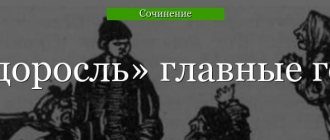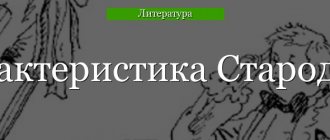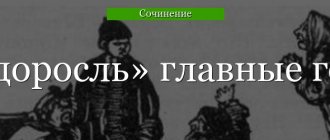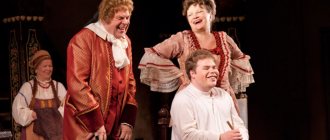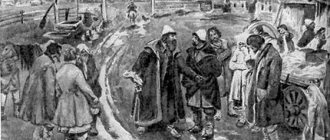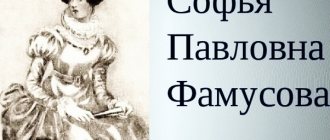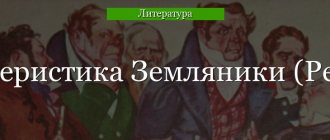Fonvizin dedicated the work to the characteristics of the nobility of the eighteenth century. The main character is Mitrofan - a sixteen-year-old guy, accustomed to living at the expense of his parents, is not interested in anything, does not do anything. The son relies on his mother and considers education unnecessary. To stop fruitlessly gnawing on the granite of science, Mitrofanushka wants to find a wife. The characterization of Mitrofanushka summarizes the traits of many noble children. The author has collected in the character the main qualities that describe the youth class.
It is no coincidence that the comedy lacks a description of the undergrowth’s appearance. Fonvizin wanted to draw the reader's attention to the character's nature. The absence of a portrait indicates that the character is typical. There are no distinctive features, he does not stand out among other noble sons.
Peter the Great in the eighteenth century issued a decree according to which all young people under twenty-one years of age who had not received an education were classified as underage. They were called that way in documents and were not allowed to participate in government or military service. Marriages were prohibited for minors. That's why the author called the comedy "The Minor."
The image of Mitrofan in the comedy “Minor” with quotes
The image of his mother's son Mitrofanushka is the main one in the work. The writer reflects in it all the features of the Russian nobility. He considers representatives of the class to be uneducated, who believe that everything is allowed to them. Characteristics of Mitrofan:
- The beloved child of his parents. They are ready to love him, admire him, and set him as an example. Mother protects her sixteen-year-old son, takes care of him as if he were a one-year-old baby. Mitrofanushka is not against her mother’s care, but she does not appreciate love at all and is often rude. The nanny made comments to the teenager: “Should you be rude to your mother? It was her crazy love for you that brought her the most misfortune.”
- Excessive care became the reason for the hero’s inability to adapt to life. He alone cannot cope with any task. Difficulties baffle him; he does not know how to achieve his goals. The only thing the teenager learned was to relax and have fun.
- The character is indifferent to people. For him, the main thing is his own well-being. This is clearly characterized by the quote: “Since we took away everything that the peasants had, we can no longer rip off anything. Such a disaster! He doesn't want to know how the peasants live.
- The child grew up not only spoiled, but also cruel. It makes no difference to him - a nanny, a teacher, an uncle or a stranger. The same applies to parents. The minor grew up to be a heartless, soulless person. He did not appreciate his mother’s love, sometimes looked at her with hatred: “Mitrofanushka looks at science like her mother, as an inevitable evil.”
- Mitrofan is completely uninterested in studying. He cannot complete a single task or test. The lesson makes him bored. “So we have one problem. I have been tormenting my stomach for four years now. After sitting down for an hour, he won’t be able to make out a new line except for his butts.”
How was Mitrofan raised and trained and what came of it?
Essay based on D.I. Fonvizin’s comedy “Minor”
I Fonvizin's Comedy-play about an undergrowth.
II How was Mitrofan raised?
1 Who is Mitrofan?
2 Who raises and trains him and how?
3 What came of it?
III Conclusion about the satirical orientation and eternity of this issue.
Fonvizin’s comedy “The Minor” became the mother of all Russian comedies, it laid the foundation for all pedagogical parables, a kind of “tease” for all ignoramuses and lazy people - “I don’t want to study, but I want to get married.”
Mitrofan is the son of a noble family, brought up in all-consuming, immeasurable love and permissiveness. Mitrofan is an ignoramus, but definitely not a fool: he knew when to flatter his mother and when it was better to keep his mouth shut. This young man is accustomed to receiving everything his soul desires, and at his single word everything will be fulfilled in the best form by his mother or servant. Mitrofan has a very interesting and varied set of teachers: Mrs. Prostakova herself, nurse Eremeevna, retired sergeant Tsifirkin, sexton Kuteikin, German coachman Adam Adamych Vralman.
All these people absolutely negatively influenced Mitrofan’s young, unformed nature, but first of all, in my opinion, Prostakova and Vralman left an indelible mark. Prostakova considered most of the most important sciences unnecessary and extremely prevented Mitrofan from achieving at least a minimal education. And Adam Adamych added fuel to the fire, saying that this kind of heavy load, in his opinion, would be harmful to Mitrofan, and the most important thing is to “know how in the world live "
The young man's lessons went in the most terrible way: instead of understanding basic things and remembering the simplest facts, he is lazy, comes up with an outrageous gag, or simply repeats after the teacher.
In this satire, Denis Ivanovich wanted to ridicule the nobility who lived in his time and served and defended their native Fatherland only for the sake of personal gain, material honors and power.
The theme of the play is eternal, due to the fact that at all times there are greedy, selfish, disgusting people who have behind their pathetic souls only an all-consuming thirst for profit, an unsatisfiable desire to have all earthly material goods, and, without a single doubt, absolute faith in their individuality, which represents the type and embodiment, personification and height of the most arrogant, most vulgar and disgusting ordinariness, pompous, undoubting and olympically calmed ordinaryness; routine of routines! Not the slightest idea of one’s own is destined to be embodied either in the mind or in the heart of such people, such people are endlessly envious; firmly convinced of their greatest genius. It was Gogol, Fonvizin, Griboedov and Dostoevsky who most wanted to heal the souls of people, showing them how dirty they were and how low they had fallen.
Useful material on the topic:
- How do I understand the image of Mitrofan
- Characteristics of Mitrofan
- Brief description of Mitrofan
- How I saw Mitrofan
- The image and character of Mitrofan
Characteristics of Mitrofanushka from the comedy “Minor” - actions, interests of the character
The characterization of Mitrofan from the comedy “The Minor” speaks of the infantilism of the child.
In principle, he does not perform any actions: he eats, lies around, chases pigeons. At the age of sixteen, Mitrofan will be able to somehow learn arithmetic and literacy. But reading, counting and other skills were not given to the teenager. The capricious little guy is constantly rude to people and insults his mother. But if problems arise, he immediately asks his mother to help solve them. Help is taken for granted. The only interest is to get married, but with only one goal - not to study anymore. All the minor actions that the hero does, he does for himself.
See also: The problem of education in the comedy “Minor”: how the topic of education is revealed
Positive characters Minor characteristics
Speech characteristics of Starodum
The language of positive characters is also characterized by certain characteristics: “logical roundness and bookishness of phrases”, “the presence of Gallicisms”. Thus, Starodum’s speech corresponds to a high style, it is logical, majestic, figurative, filled with bookish phrases and metaphors. “You are the daughter of my sister, the daughter of my heart,” “Have a heart, have a soul, and you will be a man at all times,” “The experiences of my life have taught me this,” “Such injustice has torn my heart apart.”
In the speech of this hero there are many aphorisms: “In the big world there are very small souls”, “Cash money is not cash dignity”, “Without noble deeds, a noble fortune is nothing”, “It is more honorable to be bypassed without guilt than to be granted without merit.”
However, as the researchers noted, all these aphorisms are the result of Starodum’s personal life experience. In the speech of this hero there are practically no folk proverbs and sayings. In this regard, the speech of Milon and Sophia is somewhat impoverished (compared to the speech of negative characters).
Speech characteristics of Sophia and Milona
Sophia's speech also reminds us of her uncle's speech. It is bookish, sometimes aphoristic, and metaphorical: “One cannot help but love the rules of virtue. They are ways to happiness,” “Lead my heart,” “I will use all my efforts to earn the good opinion of worthy people.”
Pravdin’s speech includes clerical phrases that reveal his social position: “I appointed him a member of the local governorship,” “I notified our boss about everything,” “...demand from the government that the insult done to her be punished to the fullest extent of the laws.”
In addition, in the speech of this character there are many Gallicisms: “I am glad to have made your acquaintance,” “I do not leave you to notice,” “they cause misfortune.” We also note the presence of Gallicisms in Milo’s speech: “I’m burning with impatience,” “I have the happiness of being loved,” “I did my duty.”
Speech characteristics of Kuteikin
Fonvizin also carefully wrote out the speech of the minor Characters. Thus, the speech of seminarian Kuteikin is patriarchal, designed in a high style, with the presence of Church Slavonicisms: “Peace to the Lord’s home and many years to come, children and household members,” “... submitted a petition to the consistory,” “And grain for the service of Man,” “Let’s go for meal."
Speech characteristics of Tsyfirkin
Tsyfirkin’s language includes bourgeois-soldier vernacular, the manner of his statements is “jokey and proverbial”: “Don’t do business, don’t run away from business,” “God gave me an apprentice, a boyar’s son,” “He’s got a sabbath from behind the board, and I’m welcome in the aftershocks.”
The distorted Russian speech of the German Vralman perfectly reveals his inner appearance - a German coachman who has tried on the role of a tutor.
Speech characteristics of Eremeevna
Researchers noted Eremeevna’s lively and expressive language: “God forbid vain lies,” “I’ll die on the spot, but I won’t give up my child,” “I’ll scratch out those thorns,” “Oh, creator, save and have mercy!”, “How can I serve more?” you don’t know... you don’t regret your belly...", "The difficult one won’t clean me up!”
In Fonvizin’s comedy, the characters for the first time freed themselves from the ponderous, bookish language that was then dominant in dramaturgy, and spoke in simple, relaxed, natural speech. All this made the comedy “Nedorosl” a truly national Russian comedy.
The speech characteristics of the characters in the comedy Nedorosl by D.I. Fonvizin have been studied thoroughly and conveyed by the author with all the depths of his soul.
Characteristics of Prostakov Jr.
Mitrofan Terentyevich Prostakov is a young man of fifteen years old, a minor. He is a nobleman, his father is the landowner Prostakov. Represents a typical mama's boy. Parents see their son as a reasonable young man, but in reality this, of course, is at odds with reality.
Relationships with parents
Mitrofanushka is spoiled and pampered; his mother and father perceive him, a teenager, as a child. He loves to eat tasty and satisfying food. The young man grows up soulless and cruel; for example, he expresses sympathy not for his father, who is being beaten, but for his mother, who gets tired when she beats the priest . The underage nobleman, day after day, allows himself to treat badly the nurse who raised him from an early age.
The young man is also indignant and curses at his own teachers: “Give me the board, the garrison rat! Ask what to write..." (quote). Prostakov Jr. is a rather stupid person with whom reasonable people will probably never have anything to do with.
To achieve his goals, Mitrofan resorts to threats towards his own mother: “blame yourself,” “here the river is close. I’ll dive, so remember my name,” and so on. The young man was always lazy, lived at the expense of his parents, and never did anything.
Prostakova evokes only negative emotions, because she raised such a terrible person who is twice as scary as her. The undergrowth is also ridiculous and awkward. All episodes with him are comic and stupid. How is it possible to fill your belly to capacity before going to bed, and the next morning complain about feeling hungry? It’s funny for a 15-year-old boy to call a babysitter every day.
Mitrofan is a satirical image in a comedy, but the essence of the young man is frightening: angry, soulless, stupid, boorish. If we assume that such “Mitrofanushki” are brought up, for example, in half of the families, society faces a serious danger from this heartlessness.
Hero's appearance
The entire ideological and artistic image of Mitrofan from the comedy “The Minor” is repulsive and negative: a guy with a shallow soul, he has a vile heart, he likes to gossip and complain - “I’ll complain to my mother again, so she’ll deign to give you a task.” Mitrofanushka’s mother loves him infinitely, but he is rude in response: “get rid of him, why did you impose yourself?”
The author introduces the reader to the undergrowth at a time when he is twirling and showing off in a brand new caftan. The young man’s mother is located nearby and scolds the tailor’s work. The young man is already quite old, he is tall and of a thick build. His face is not particularly smart, just like his deeds. In general, the appearance can be described as clumsy and repulsive.
Day after day, the main delight of a young nobleman is caused by making fun of others, fooling, and pampering. The guy is absolutely well fed, he does not limit himself in food, for this reason the young man regularly has severe stomach pain.
The body grew great, but Mitrofan’s heart and character were not addressed. The young man is convinced that his intelligence will not be useful to him in life (he has been studying the alphabet with a teacher for about three years), believes that all the difficulties on his life’s path will be resolved and determined through his efforts by his mother. She, it should be noted, practically managed to marry her own son to the wealthy heiress Sofia, who, in addition, is very pretty and kind-hearted.
